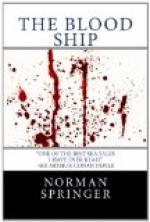Yet, despite his care, he nearly lost. Mister Fitzgibbon brushed past Cockney, who was standing alone by the forward end of the deck-house. He croaked something at the man, an oath, I thought. Cockney waited until he passed by, and then suddenly whipped out his knife and drew back his arm to throw it at the mate’s back.
Newman might possibly have reached Cockney. But he did not try. Instead, he leaped in the other direction, a cat-like bound that took him over to the rail, as far away from Cockney as he could get. It was Holy Joe who spoiled Cockney’s knife-play. He was standing behind Cockney, and, quick as Newman himself, he leaped forward and struck Cockney’s arm. It spoiled the aim. The knife did not go in the mate’s direction at all; it went flashing across the deck, and stuck quivering in the rail.
“You fool!” cried Holy Joe.
The mate wheeled about at that. Aye, and he had his pistol half out of his pocket as he turned. We could see by his face that he understood what had happened; indeed, he would have been blind not to have been able to read the meaning of the scene—Cockney still bent in the attitude of throwing, and the parson clutching his arm. I expected—we all expected—he would shoot Cockney. Surely, this was his chance, if he wanted trouble.
But he hardly glanced at the man. His eyes passed him by, and darted about until they spotted Newman lounging over there by the rail, with his hands in his pockets. I guess it was an unpleasant surprise to find Newman over there, just opposite to where he expected to find him. The knife was sticking in the rail close by Newman’s shoulder; there could be no connecting it and Newman—indeed, Newman’s own knife was in plain view, in its sheath.
Newman shook his head. “Not this time, Mister,” says he.
The mate was stumped, and enraged. His face grew actually purple with his choked rage, as he glared at Newman. But he did not draw the gun free of his pocket; he had no excuse to offer Newman violence, and he did not deign to notice Cockney. He did not even seem to notice the naked knife. Slowly his hand opened, and the butt of the weapon dropped back into his pocket. Then he turned, and went aft.
I breathed again. So, I guess, did the others. When Fitzgibbon was beyond ear-shot, Cockney began to damn Holy Joe for spoiling his aim. But he didn’t get very far with his tirade before Newman had him shouldered against the wall of the deck-house.
Cockney changed his tune then, and mighty quick. For Newman looked as he had looked that day in the Knitting Swede’s; aye, there was death in his face.
“Ow, Gaw’, ’ear me. Hi didn’t mean no trouble!” Cockney bleated. “Hit was the nyme ’e called me. ’E myde me see red, that’s wot.”
“Would have been a damn good job if he’d landed!” cried Boston’s voice. There was an emphatic chorus of approval of this sentiment from the hands, from squareheads and stiffs both. “We’d have been rid of one o’ them, anyhow!” piped up Blackie.




